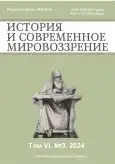Worldview foundations of Russian history of the X–XVII centuries
- Authors: Gerasimov G.I.1
-
Affiliations:
- Tula Museum of weapons
- Issue: Vol 6, No 3 (2024)
- Pages: 13-20
- Section: DEBATING ISSUES OF HISTORY
- URL: https://journal-vniispk.ru/2658-4654/article/view/279862
- EDN: https://elibrary.ru/BVTSWK
- ID: 279862
Cite item
Abstract
The purpose of the article is to substantiate, from the standpoint of the author’s idealistic approach, the theoretical and methodological foundations of Russian history of the 10th–17th centuries. It outlines both a general view of the ideological foundations of national history in a given period, and the influence of ideas on the formation of the main spheres of public, state, cultural and economic life. The ideological foundations of the history of the pagan period of the Eastern Slavs, and their impact on the life of society, the state and the individual are considered. Paganism achieved its greatest successes in agriculture and crafts; achievements in culture and art during the pagan period were small. The renunciation of paganism and the baptism of Rus' was a voluntary decision of Prince Vladimir, who ceased to believe in the former gods. Baptism is an ideological revolution that determined the history of Rus' and Russia until the twentieth century. With the adoption of Christianity, the national idea of the Russian people became the Symbol of Faith, and the ideological basis was the ideas of the Holy Scriptures. The Christian Orthodox worldview, while remaining unchanged in its main idea, changed over time in the ideas of the second and third levels, which determined the consciousness and historical actions of Russian people in the political, social, legal, cultural, economic and other spheres of life, which determined both the evolution of the worldview and the nature of the historical actions of the Russian people. The initial period of the dominance of theocentrism was replaced by pragmatism and anthropocentrism, and then by humanism and rationalism. These changes in public consciousness underlay the history of the Russian people in the 10th–17th centuries. The Orthodox worldview was refined and changed both under the influence of external factors, and during the struggle against heresies, and discussions about ways of development within the Church. As a result of intense creative work, the main ideological, political, and social concepts were developed that guided the church and government in their historical activities. The Orthodox national idea formed the Russian national identity by creating the Russian people and formed the social structure of society, filled the ancient Russian state with high meaning and purpose, ensured success in those areas of activity that helped medieval man achieve his main goal — the salvation of the soul, as well as the preservation of Orthodoxy, spread and protection faith.
Full Text
##article.viewOnOriginalSite##About the authors
Grigory I. Gerasimov
Tula Museum of weapons
Author for correspondence.
Email: ggi1957@mail.ru
ORCID iD: 0000-0003-4479-2620
ResearcherId: R-7767-2016
Dr. Sci. (Hist.), Associate Professor, Scientific consultant
Russian Federation, TulaReferences
- Antonov D. I. Tsars and impostors: the struggle of ideas in Russia during the Time of Troubles. Moscow: RSUH, 2019.
- Gerasimov G. Idealistic approach to history: theory, methodology, concepts. Yekaterinburg: Izdatelskie resheniya, 2022.
- Gerasimov G. I. Ideological foundations of the history of Russia (mid-19th – early 20th centuries). Tula: Tretiy Put, 2019.
- History of Russia from ancient times to the end of the 18th century: Textbook / Ed. B. N. Flory. Moscow: Moscow State University Publishing House, 2010.
- Niederle L. Slavic antiquities. St. Petersburg: Aleteia. 2000.
- Panchenko A. M. On Russian history and culture. St. Petersburg: Azbuka. 2000.
- Perevezentsev S. V. The Origins of the Russian Soul. Finding Faith. 10th–17th Centuries. Moscow: Eksmo, 2015.
- Toporov V. N. Holiness and Saints in Russian Spiritual Culture. T. I. The First Century of Christianity in Rus'. Moscow: Languages of Russian Culture Publishing House, 1995.
- Uzhankov A. N. The Worldview of an Old Russian Scribe. Categories of Russian Medieval Culture. Moscow: Institute of Heritage, 2022.
- Florovsky G. V. The Paths of Russian Theology. Moscow: Institute of Russian Civilization, 2009.
- Chernaya L. A. History of the Culture of Ancient Rus'. Moscow: Logos, 2007.
- Shakhmatov M. V. History of Old Russian Political Ideas. The Beginning of Sobornost and the Beginning of Sole Power. Moscow: Publishing House. M. B. Smolina (FIV), 2023.
Supplementary files








